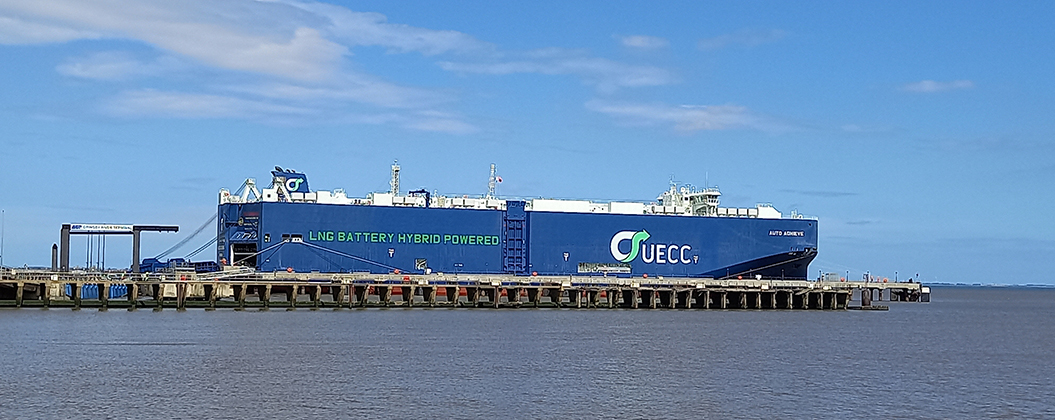The first deep sea car carrier powered by a multi-fuel liquefied natural gas/battery hybrid engine to arrive at the Grimsby River Terminal has brought in a cargo of Kia vehicles.
MV Auto Achieve, owned by United European Car Carriers, was built this year at the Jiangnan Shipyard, China, and is the second pure car and truck carriers vessel in its sustainable fleet. It is also the first Eukor vessel to come to the GRT, as these deep-sea carriers usually berth at the Port of Immingham’s Humber International Terminal.
Simon Bird, Regional Director for the Humber Ports said: “This is a great opportunity to see how sustainable vessels can be and LNG fuelled ones are growing in popularity. We expect to see more of them in our ports as operators look to lower their carbon footprint.”
Paul Philpott, President and CEO of Kia UK Ltd. said: “At Kia our vision is to become a truly sustainable, responsible and innovative mobility solutions leader, this is outlined in a clear and achievable strategy leading up to 2045 when we’ve committed to achieve carbon neutrality. Part of this plan focusses on collaboration with our supply chain partners to achieve lower emissions throughout our entire value chain. UECC’s MV Auto Achieve vessel is a great example of innovation to enhance emissions reduction and we’re proud to have our new electrified vehicles transported via one of the cleanest methods possible today.”
Daniel Gent, Energy and Sustainability Manager at UECC, added: “Auto Achieve is the greenest and most technologically-advanced car carrier built to date. Powered by a multi-fuel LNG battery hybrid system, our customers benefit from a carbon reduction up to 40% whilst transporting their cargo onboard.
“Additionally, the vessels unique design allows for improved air quality in the port and the local area. Grimsby is an important place that holds more than 30 years’ history for our organisation, and we are immensely proud to see our newest vessel here today.”
According to UECC, these multi-fuel engine vessels enable a carbon dioxide emissions reduction of around 25%, SOx and particulate matter by 90% and NOx by 85% from the use of LNG and are also adaptable for low-carbon fuels such as bio-LNG and synthetic fuels as these become available.



